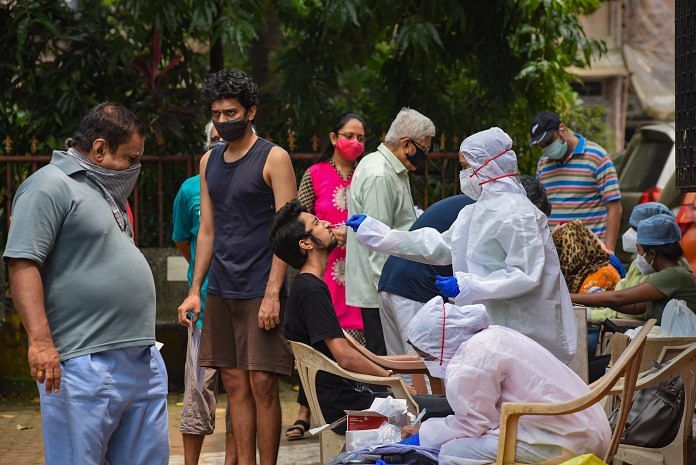New Delhi: The fever clinics in Dharavi that helped control Covid-19 in Asia’s largest slum, mobile vans in Gujarat that dispensed non-Covid essential health services during the pandemic, and Andhra Pradesh’s contact-tracing app that used mobile tower locations to trace the path taken by a positive patient have found place in a compendium of the best Covid-19 practices, put together by NITI Ayog.
Fragments of the Agra and Bhilwara models that were touted as ideal at the start of the pandemic, before the former emerged as a hotspot, too appear in the document titled Mitigation and Management of COVID19 — Practices from Indian States and Union Territories.
In his foreword, NITI Aayog CEO Amitabh Kant has said the purpose of the volume is to “take note of practices that are grounded in our realities”.
“Instead of expecting every State to reinvent the wheel, dissemination of such practices allows them to learn from each other and help find solutions to common problems,” the foreword said.
An email was sent to all states and union territories (UTs) in July, requesting them to share any practices or models that they believe had been useful for Covid-19 mitigation and management. The collection includes what states sent and also literature searches for relevant case studies and papers.
Also read: Govt says vaccinating ‘critical mass’ for Covid herd immunity an option. Some experts not sure
Technology played major role
From Kerala’s GPS-based route maps to trace possible contacts of Covid patients to Jharkhand’s co-bots, technology was deployed to various extent by a number of states.
Developed at Rs 25,000 with a carrying capacity of 45 kg, Jharkhand’s co-bots have been deployed to minimise interaction between ancillary health workers and Covid patients. In Covid hospitals, the co-bots deliver medicine, food and water to patients.
“The machine can be operated with a remote within a 200 feet range. Co-bots, which are fitted with a Wi-Fi camera and microphone, can move freely and operate remotely for two-way communication,” reads the NITI Aayog document. “They are also waterproof, which makes it easy to sanitise them once they have been in contact with a patient. Further, they are fitted with an ultrasonic obstacle warning system.”
In Tamil Nadu, a hospital developed a six-layered protection model based on artificial intelligence (AI). The Meenakshi Mission Hospital and Research Centre in Madurai deployed the ‘Tanjore Air Barrier Technique’ for delivering compressed medical grade air to health personnel in operation theatres through a hood and Bluetooth stethoscope.
The hospital implemented a six-layered protection model, which leverages AI and robotics for detecting symptoms in visitors (through smart infrared AI helmets for checking temperature, smart fever clinics and smart thermal surveillance cameras), sterilising facilities as well as treating patients, without the need for contact.
Health facilities in Noida used four types of masks for regulating the level of oxygen concentration — while the normal mask supplies 30 per cent oxygen, three other types were kept in reserve. The venturi mask provides up to 65 per cent oxygen, a high flow nasal canula increases oxygen concentration to 80 per cent and the non-rebreathing mask with reservoir releases up to 90 per cent oxygen.
Also read: Modi govt’s 11 Covid empowered panels now replaced by six larger groups
Mobile heath
To cater to the home-bound population during and after lockdown, many states went mobile. The Ahmedabad Municipal Corporation developed the ‘Dhanwantari Rath’, which is a mobile van providing non-Covid essential health services to the doorsteps of people in the city.
The scope of health services provided by the mobile medical vans has now been extended to include malaria and dengue tests, the NITI Aayog report says.
“The strategy that helped contain the Covid outbreak in Worli and Dharavi helped to shape the BMC’s Rapid Action Plan as part of which 50 mobile fever clinics in ambulances were pressed into action,” the report adds. “The mobile clinics carried out door-to-door screening of residents through a team of doctors who checked for fever and other symptoms, monitored co-morbidities, and collected swabs for suspected cases.”
Also read: Herd immunity is a mystery, Sweden’s top epidemiologist says



